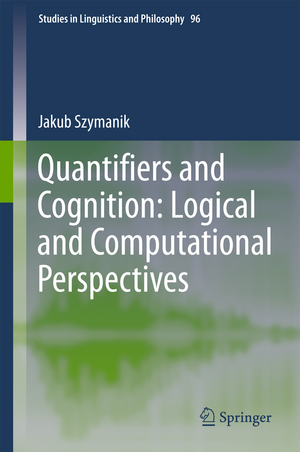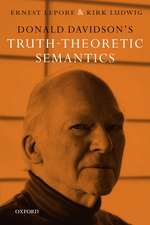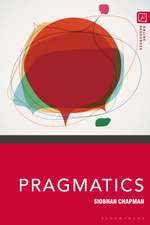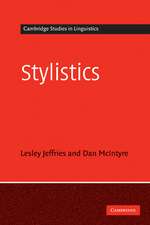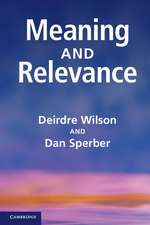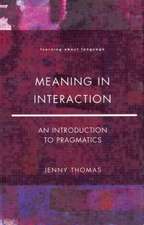Quantifiers and Cognition: Logical and Computational Perspectives: Studies in Linguistics and Philosophy, cartea 96
Autor Jakub Szymaniken Limba Engleză Hardback – 9 mar 2016
This volume on the semantic complexity of natural language explores the question why some sentences are more difficult than others. While doing so, it lays the groundwork for extending semantic theory with computational and cognitive aspects by combining linguistics and logic with computations and cognition.
Quantifier expressions occur whenever we describe the world and communicate about it. Generalized quantifier theory is therefore one of the basic tools of linguistics today, studying the possible meanings and the inferential power of quantifier expressions by logical means. The classic version was developed in the 1980s, at the interface of linguistics, mathematics and philosophy. Before this volume, advances in "classic" generalized quantifier theory mainly focused on logical questions and their applications to linguistics, this volume adds a computational component, the third pillar of language use and logical activity. This book is essential reading for researchers in linguistics, philosophy, cognitive science, logic, AI, and computer science.
| Toate formatele și edițiile | Preț | Express |
|---|---|---|
| Paperback (1) | 362.12 lei 38-45 zile | |
| Springer International Publishing – 7 apr 2018 | 362.12 lei 38-45 zile | |
| Hardback (1) | 375.45 lei 38-45 zile | |
| Springer International Publishing – 9 mar 2016 | 375.45 lei 38-45 zile |
Din seria Studies in Linguistics and Philosophy
- 15%
 Preț: 583.78 lei
Preț: 583.78 lei - 18%
 Preț: 728.43 lei
Preț: 728.43 lei - 20%
 Preț: 1918.94 lei
Preț: 1918.94 lei -
 Preț: 393.35 lei
Preț: 393.35 lei - 18%
 Preț: 1219.29 lei
Preț: 1219.29 lei - 18%
 Preț: 733.78 lei
Preț: 733.78 lei - 20%
 Preț: 563.40 lei
Preț: 563.40 lei - 20%
 Preț: 509.79 lei
Preț: 509.79 lei - 15%
 Preț: 645.28 lei
Preț: 645.28 lei - 18%
 Preț: 723.69 lei
Preț: 723.69 lei - 18%
 Preț: 1552.05 lei
Preț: 1552.05 lei - 18%
 Preț: 953.65 lei
Preț: 953.65 lei - 15%
 Preț: 647.27 lei
Preț: 647.27 lei - 18%
 Preț: 959.98 lei
Preț: 959.98 lei - 18%
 Preț: 1832.39 lei
Preț: 1832.39 lei - 15%
 Preț: 646.30 lei
Preț: 646.30 lei - 18%
 Preț: 953.03 lei
Preț: 953.03 lei - 18%
 Preț: 1224.06 lei
Preț: 1224.06 lei - 18%
 Preț: 952.09 lei
Preț: 952.09 lei -
 Preț: 394.71 lei
Preț: 394.71 lei - 18%
 Preț: 942.01 lei
Preț: 942.01 lei - 18%
 Preț: 947.50 lei
Preț: 947.50 lei - 18%
 Preț: 955.70 lei
Preț: 955.70 lei - 18%
 Preț: 1223.43 lei
Preț: 1223.43 lei - 15%
 Preț: 653.00 lei
Preț: 653.00 lei - 15%
 Preț: 645.28 lei
Preț: 645.28 lei -
 Preț: 391.99 lei
Preț: 391.99 lei - 18%
 Preț: 942.01 lei
Preț: 942.01 lei
Preț: 375.45 lei
Nou
Puncte Express: 563
Preț estimativ în valută:
71.84€ • 75.01$ • 59.46£
71.84€ • 75.01$ • 59.46£
Carte tipărită la comandă
Livrare economică 31 martie-07 aprilie
Preluare comenzi: 021 569.72.76
Specificații
ISBN-13: 9783319287478
ISBN-10: 3319287478
Pagini: 211
Ilustrații: XIV, 211 p. 49 illus.
Dimensiuni: 155 x 235 x 14 mm
Greutate: 0.5 kg
Ediția:1st ed. 2016
Editura: Springer International Publishing
Colecția Springer
Seria Studies in Linguistics and Philosophy
Locul publicării:Cham, Switzerland
ISBN-10: 3319287478
Pagini: 211
Ilustrații: XIV, 211 p. 49 illus.
Dimensiuni: 155 x 235 x 14 mm
Greutate: 0.5 kg
Ediția:1st ed. 2016
Editura: Springer International Publishing
Colecția Springer
Seria Studies in Linguistics and Philosophy
Locul publicării:Cham, Switzerland
Public țintă
ResearchCuprins
Introduction.- Acknowledgments.- Part I: Procedural Semantics.- 1. Algorithmic Theory of Meaning.- 2. Complexity in Linguistics.- Part II: Simple Quantifiers.- 3. Basic Generalized Quantifier Theory.- 4. Computing Simple Quantifiers.- 5. Cognitive Processing of Quantifiers.- Part III: Complex Quantifiers.- 6. Standard Polyadic Lifts.- 7. Complexity of Polyadic Quantifiers.- 8. Complexity of Quantified Reciprocals.- 9. Branching Quantifiers.- Part IV: Collective Quantifiers.- 10. Complexity of Collective Quantification.- Part V: Perspectives and Conclusions.- Conclusions.- A. Mathematical Machinery.- Bibliography.- Subject Index.
Recenzii
“Jakub Szymanik has produced an important new book, Quantifiers and Cognition: Logical and Computational Perspectives … which returns logic to center stage in an important area of human cognitive studies, where the psychology and neuroscience of language, number and reasoning intersect and interact. … the book is a valuable source of new results for the theoretician, and a gold mine for the experimenter.” (Giosue Baggio and Heming Strømholt Bremnes, Studia Logica, Vol. 105, 2017)
Textul de pe ultima copertă
This volume on the semantic complexity of natural language explores the question why some sentences are more difficult than others. While doing so, it lays the groundwork for extending semantic theory with computational and cognitive aspects by combining linguistics and logic with computations and cognition.
Quantifier expressions occur whenever we describe the world and communicate about it. Generalized quantifier theory is therefore one of the basic tools of linguistics today, studying the possible meanings and the inferential power of quantifier expressions by logical means. The classic version was developed in the 1980s, at the interface of linguistics, mathematics and philosophy. Before this volume, advances in "classic" generalized quantifier theory mainly focused on logical questions and their applications to linguistics, this volume adds a computational component, the third pillar of language use and logical activity. This book is essential reading for researchers in linguistics, philosophy, cognitive science, logic, AI, and computer science.
Caracteristici
Combines in a novel way logic, natural language semantics, philosophy of mind and language with theoretical computer science and cognitive science Provides experimental evidence linking computational complexity with cognitive difficulty Contains extensive philosophical and methodological discussion of the natural language expressivity borders Includes supplementary material: sn.pub/extras
